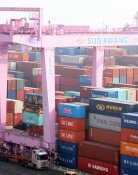The ruling party proposes pork barrel policies
The ruling party proposes pork barrel policies
Posted January. 16, 2024 07:32,
Updated January. 16, 2024 07:32
South Korean President Yoon Suk Yeol has been presiding over discussions on people’s livelihoods and revealed surprise policies. The past three discussions have been held in metropolitan areas where the ruling party has been showing weakness before the general elections in April. The government and the ruling party have been announcing measures targeting 550,000 self-employed people and small business owners.
During the third discussion on people’s livelihoods held at Sungkyunkwan University in Suwon, Gyeonggi Province on Monday, President Yoon announced that 622 trillion won will be invested in a semiconductor mega cluster to be built in the region by 2047. A plan to permanently operate the tax deduction benefits, which were supposed to end by the end of this year, was also announced. However, some criticize the plan as a self-flattery as most of the investment falls on the private sector and the cluster will be completed 23 years later.
During the first discussion in Yongin, Gyeonggi Province on January 4, the president said the short-selling ban wouldn’t be lifted (until side effects are addressed), targeting 14 million independent traders. He also said reconstruction would be allowed without safety diagnosis for houses 30 years or older during the second discussion held in Goyang, Gyeonggi Province on January 10.
The government and the party are also working to introduce a measure to reduce interest on loans by up to 1.5 million won per person for 400,000 self-employed people who took out loans from non-monetary institutions. The measure introduced in December last year to give back up to 90 percent of interests that exceed four percent per year for 1.87 million self-employed people is being expanded to non-monetary institutions. In addition, the government and the party are also working to introduce credit pardons to remove the records of late payments for 2.9 million self-employed people.
The past administrations all produced pork barrel policies before nationwide elections. What’s problematic is that most policies recently proposed by the government and the ruling party are opposed by the Democratic Party of Korea, which makes it uncertain whether the policies would be implemented after the general elections. Allowing reconstruction of apartment units that are over 30 years old without safety diagnosis and permanently running the tax deduction benefits on investment requires the revision of relevant laws. The extended ban on short selling is being criticized for potentially having a negative impact on share prices by preventing the advancement of stock markets. The policy of putting pressure on financial institutions to reduce the burden on the self-employed is met with intense criticism for the bureaucratic economy.
The government will continue discussions on people’s livelihoods presided over by the president by early March, a month before the general elections. The megacity vision the ruling party proposed in October last year to include Gimpo and other cities in Seoul is already being forgotten. It is doubtful whether the ruling party can fulfill its promises when asked to implement them after the general elections.







